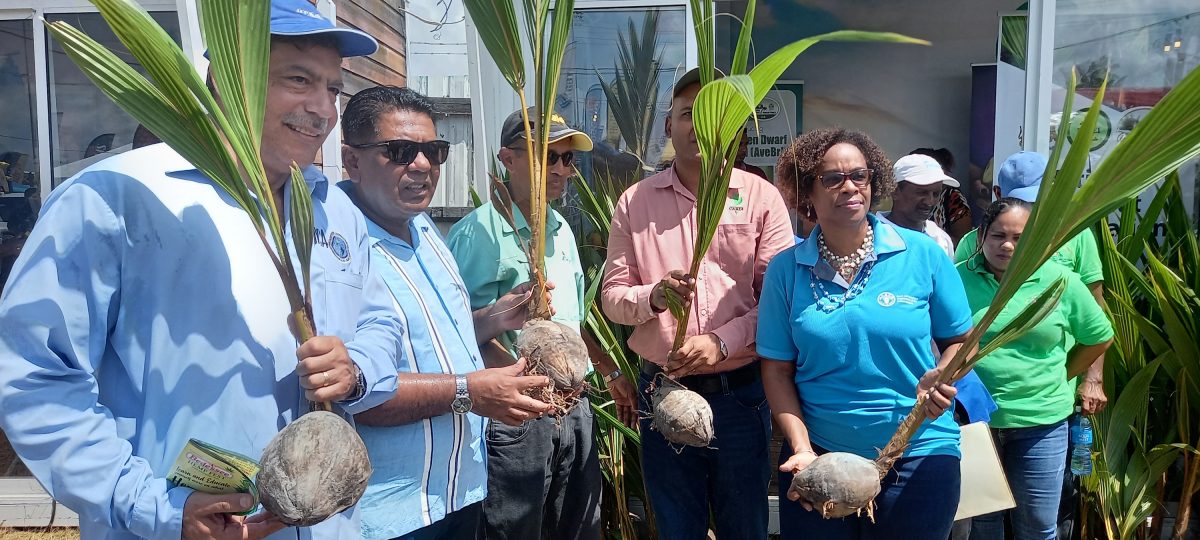As the government continues to implement its plan to meet the goal of reducing the country’s food imports by 25% by 2025, Minister of Agriculture Zulfikar Mustapha yesterday detailed twenty ongoing projects which he said will boost food security and reduce imports.
Mustapha celebrated World Food Day at the Albion Sports Complex where the Berbice Expo and Trade Fair is currently being held. Guyana is the lead player in the CARICOM initiative to reduce food imports by 25% by 2025. The country is however still to produce a specific plan outlining which imports will be reduced and by how much.
The Minister stressed that the government is working on creating an enabling environment for sustainable food systems, ensuring intergenerational equity, and encouraging the strengthening of local food production and consumption.
He stated that the championing of “food security and leaving no one behind” requires development beyond traditional agriculture and requires different actions from the “business as usual” attitude. “Guy-ana’s Agriculture Sector must be expanded, diversified and modernized, and made resilient to be a competitive sector in Guyana and CARICOM”, he said.
Listing twenty ongoing projects at hand, Mustapha said the authorities are working to increase rice production by 25% by 2025 to approximately 860,000 metric tonnes, increase sugar production to 100,000 metric tonnes by 2025, and open up new lands for cultivation.
“In Region 6, the recently commissioned Phase 1 of the Number 58 road will see over 50,000 acres (opened up) and the Canje Project will see new lands of over 150,000 acres.”
According to him, in Region 10, the government spent approximately $1 billion for a 47 km access road – construction to open lands for the development of the intermediate savannah for corn, cattle, and soya beans.
The government is also working to cultivate 25,000 acres of corn and soya by 2025 and to expand the Coconut Industry.
He referenced the Agriculture and Innovation Entrepreneurship Program-me (AEIP) where shade house technology for high-value crops such as lettuce, carrot, cauliflower and broccoli is being used.
Mustapha then pointed out that the Black Belly Sheep project in collaboration with Barbados is being done “to create a CARICOM brand and replace imports from countries like New Zealand and Australia.”
He said that over 2,000 sheep are to be imported and he noted, “The Vannamei Prawns Project to be here in Berbice (will benefit) over 500 youths.”
He also adverted to the Cage Culture Project focusing on increasing the production of tilapia and tambaqui and establishing international-standard beef and swine abattoirs.
He said there is also a spice, coffee and cocoa revitalization programme, and works to become self-sufficient in onion cultivation are ongoing, along with the commencement of wheat production to reduce imports.
Programmes have been ongoing for several years to cultivate onions and potatoes but returns have been marginal.
He also cited plans for an industrial hemp industry and cut flower project to create job opportunities, especially for single mothers.
He noted that there has also been an increase in the agriculture allocation from 5% to 10% of the national budget inclusive of a hike in the allotment to drainage and irrigation works.
According to the minister, “These are some of the projects we are implementing so far and there are many more projects in the pipeline. The current strategies and policies of the agriculture sector are interlinked with the government’s manifesto of making agriculture attractive and thriving for everyone.”
Agriculture Month is being celebrated under the theme, ‘Championing food security through innovation, investment, and resilience’ and with this, in mind, Mustapha stressed, “We are in a different era, the contextual framework of our world is nothing like that before us. There is a need to transform our food systems to adapt to climate change. We have all witnessed the importance of sustainable and growing agriculture in light of the disruptions to food supply during the pandemic, and resulting from the Russia-Ukraine War. We are protecting livelihoods and planning for recovery.”
According to him, the number of people experiencing moderate or severe food insecurity in Latin America and the Caribbean increased from 205.2 million in 2019 to 267.7 million in 2021. He said, “Guyana must act now and create the environment to achieve our potential of feeding the CARICOM region.”
He added that “Guyana has and will continue to contribute positively to the very important vision of the CARICOM region to reduce the food import bill by 25% by 2025. The Government of Guyana, therefore, emphasizes the need for an increase in production, good agriculture practices, better nutrition, improved livelihoods, and a better life for all of us.”
Meanwhile, a soil care project was launched in celebration of World Food Day at the location yesterday. In delivering remarks, Mustapha stated, “Soil and water are essential to our food system. It is estimated that 95% of our food is directly or indirectly produced on our soils. Therefore, healthy soils are the foundation of what I have outlined earlier.”
He said that over the last seven years, NAREI has been only been able to digitise 38% of soil maps. “This project will provide an open-access National Soil Information (NSI) system. It will expedite the digitalization of the remaining 101 soil maps, and at the same time enhance technical skills and the soil laboratory”, he said.









